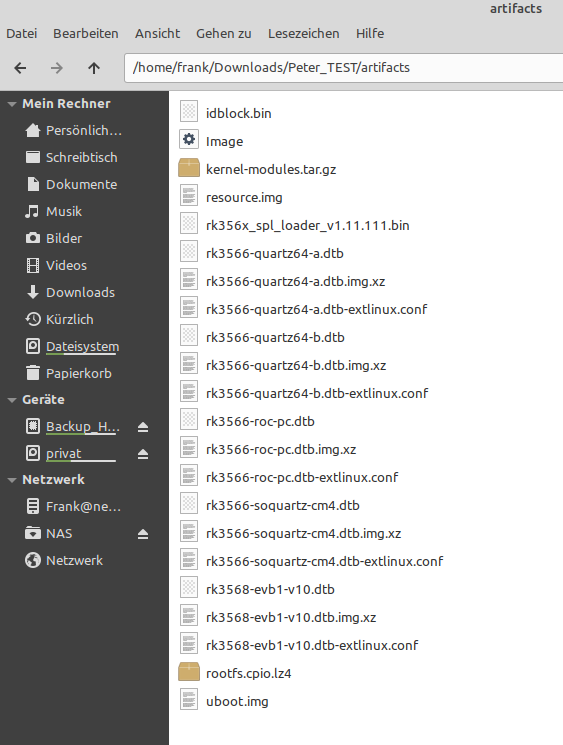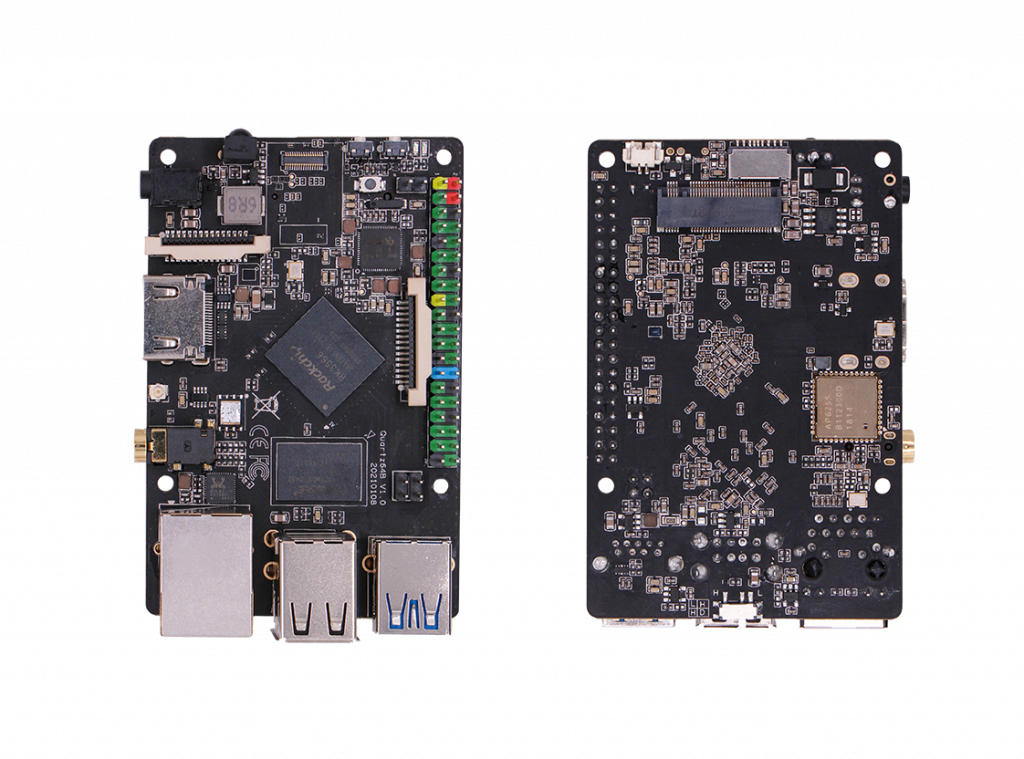Quartz64 - Plebian
-
Gerade über was gestolpert.
Releases · Plebian-Linux/quartz64-images
GitHub Actions Repository for automatically generated images for the Quartz64 family of single board computers - Releases · Plebian-Linux/quartz64-images
GitHub (github.com)
This repository contains the GitHub workflow files and debos recipes to create custom Debian-based operating system images for the Quartz64 line of SBCs from PINE64, including the SOQuartz.
Das könnte man mal probieren...
-
Mal beim Kaffee eben ausprobieren.
Die Releases findet man hier -> https://github.com/Plebian-Linux/quartz64-images/releases
Und ein paar Anmerkungen zum Image -> https://github.com/Plebian-Linux/quartz64-images/blob/main/RUNNING.md
User:pleb PW: plebPasswort muss wie gewohnt beim ersten Start geändert werden.
Danach habe ich das Debian aktualisiert
apt update && apt upgradeDanach haben wir dann einen
root@plebian-quartz64b:~# uname -a Linux plebian-quartz64b 6.1.0-1-arm64 #1 SMP Debian 6.1.4-1 (2023-01-07) aarch64 GNU/Linuxrecht aktuellen Kernel. Die Debian Version ist
root@plebian-quartz64b:/etc# cat debian_version bookworm/sidBookworm ist das kommende Debian 12, das soll so ca. im März(?) released werden.
Mit blkid werden alle angeschlossenen Laufwerke angezeigt.
root@plebian-quartz64b:/etc# blkid /dev/nvme0n1p1: UUID="497aa9d6-2e0c-4927-bb8f-9927970b1abe" BLOCK_SIZE="4096" TYPE="ext4" PARTUUID="bd856e70-94c0-3345-a9d6-7ff080b5a2e0" /dev/mmcblk0p3: LABEL="root" UUID="da21d2fe-1093-46d2-bd96-5fb6b11e07eb" BLOCK_SIZE="4096" TYPE="ext4" PARTLABEL="root" PARTUUID="3fbd2cf5-e08d-4f39-8ca4-9fb5cff746df" /dev/mmcblk0p1: PARTLABEL="idbloader" PARTUUID="3eac6306-dee4-4c0c-9cfa-2d610b74b61b" /dev/mmcblk0p2: PARTLABEL="uboot" PARTUUID="7129c8a9-86f4-4807-be66-7d12398c6e9a" /dev/sda4: LABEL="linux-root" UUID="b1612f09-7ae0-4217-be0e-bdc2e51248d1" BLOCK_SIZE="4096" TYPE="ext4" PARTLABEL="linux_root" PARTUUID="cdc03a35-d726-48f6-8bef-918981debbf6" /dev/sda2: SEC_TYPE="msdos" LABEL_FATBOOT="boot-efi" LABEL="boot-efi" UUID="6891-ACCB" BLOCK_SIZE="512" TYPE="vfat" PARTLABEL="boot_efi" PARTUUID="0af3de6b-3b38-42f3-ae0c-336c5d39c874" /dev/sda3: LABEL="linux-boot" UUID="e64ed73c-b603-43af-851c-d5eef81a1aa9" BLOCK_SIZE="1024" TYPE="ext4" PARTLABEL="linux_boot" PARTUUID="b3b30dbb-4dcb-4652-aef1-ebc720eb0e59" /dev/sda1: PARTLABEL="loader1" PARTUUID="86d433a9-c91b-48aa-9867-36ef588a600f"Man sieht meine angeschlossene NVMe SSD und die Platte am USB3.
Man hat eine HDMI Ausgabe, Netzwerk ist klar, der WiFi-Chip geht nicht. Dazu steht im Readme
Plebian (or Debian, for that matter) does not yet properly package the wireless firmware needed for the Model B or SOQuartz's Wi-Fi chip. Therefore, Wi-Fi won't work out of the box.
Müsste man sich also mit beschäftigen....
Ansonsten macht das für mich auf den ersten Blick einen soliden Eindruck.
-
 F FrankM hat am auf dieses Thema verwiesen
F FrankM hat am auf dieses Thema verwiesen
-
-
-
-
-
Quartz64 - dts File bearbeiten
Angeheftet Verschoben Quartz64 -
-
-


